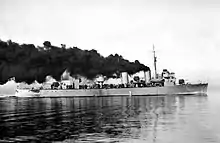Klas-class destroyer
The Klas class, also referred to as the Klas Horn class, was a pair of destroyers in service with the Swedish Navy from 1932 to 1958. They are sometimes considered part of the preceding Ehrensköld-class destroyers. Two ships in the class was constructed between 1930 and 1932, HSwMS Klas Uggla and HSwMS Klas Horn. The ships were involved in the Hårsfjärden disaster in 1941, in which both ships were damaged. Klas Uggla was raised but decommissioned, Klas Horn was repaired and continued to serve in the navy until 1958.
.jpg.webp) HSwMS Klas Uggla | |
| Class overview | |
|---|---|
| Name | Klas class |
| Builders |
|
| Operators | |
| Preceded by | Ehrensköld class |
| Succeeded by | Göteborg class |
| Built | 1930–1932 |
| In commission | 1932–1958 |
| Planned | 2 |
| Completed | 2 |
| Lost | 1 |
| Retired | 1 |
| General characteristics | |
| Type | Destroyer |
| Displacement | 1,020 long tons (1,040 t) |
| Length | 91.0 m (298.6 ft) pp |
| Beam | 8.9 m (29.2 ft) |
| Draught | 3.7 m (12.1 ft) max |
| Propulsion |
|
| Speed | 36 knots (67 km/h; 41 mph) |
| Range | 1,600 nmi (3,000 km; 1,800 mi) at 20 knots (37 km/h; 23 mph) |
| Complement | 130 |
| Armament |
|
Description

The Klas class were an improved version of the preceding Ehrensköld-class destroyers and were sometimes considered part of the class.[1][2] They had a standard displacement of 1,020 long tons (1,040 t) and were 91.0 m (298.6 ft) long between perpendiculars with a beam of 8.9 m (29.2 ft) and a maximum draught of 3.7 m (12.1 ft). The destroyers were powered by three Penhoët boilers delivering steam to two de Laval geared turbines each driving one propeller shaft, rated at 26,000 shaft horsepower (19,000 kW). This gave the destroyers a maximum speed of 36 knots (67 km/h; 41 mph). The Klas class carried 150 long tons (150 t) of fuel oil and had a range of 1,600 nautical miles (3,000 km; 1,800 mi) at 20 knots (37 km/h; 23 mph).[1]
The Klas-class destroyers main armament was three single 120 mm (5 in)/46 calibre guns and two triple 533 mm (21 in) torpedo tubes. For anti-aircraft defence, the destroyers were equipped with two Vickers 40 mm (1.6 in) cannon. These were later replaced with four 25 mm (0.98 in) Bofors cannon. The destroyers were armed with two depth charge throwers for anti-submarine warfare and were issued 20 naval mines. The ships had a complement of 130.[1]
Ships in class
| Klas class | |||||
|---|---|---|---|---|---|
| Name | Builder | Laid down | Launched | Completed | Fate |
| Klas Horn | Kockums | 1929 | 13 June 1931 | 1932 | Stricken 15 August 1958 |
| Klas Uggla | Karlskrona Navy Yard | 1929 | 18 June 1931 | 1932 | Sunk 17 September 1941 |
Operational history
Both ships were laid down in 1929, with Klas Horn being constructed by Kockums and Klas Uggla built by the Karlskrona Navy Yard. Klas Horn was launched on 13 June 1931 and Klas Uggla on 18 June 1931. They were both completed in 1932.[1] The Klas-class destroyers were sometimes used to escort Swedish ore carriers and German troop transports.[3] On 17 September 1941, an unsolved explosion at Hårsfjärden Naval Base known as the Hårsfjärden disaster took place. Both Klas-class destroyers were sunk in the explosion along with the destroyer HSwMS Göteborg.[1] In the explosion, thirty-three were killed and seventeen wounded from the three ships.[3] Klas Horn was raised and returned to service, using parts from the non-repairable Klas Uggla. The vessel's anti-aircraft weaponry was increased to six 25 mm cannon. Klas Horn remained in active service until 1958. From 1958 until 1967, the ship was used as a training hulk. On 14 November 1967, Klas Horn was sold for scrap.[1]
Citations
- Chesneau 1980, p. 372.
- Parkes 1933, p. 448.
- Gilmour 2011, p. 140.
Sources
- Chesneau, Roger, ed. (1980). Conway's All the World's Fighting Ships 1922–1946. Greenwich, UK: Conway Maritime Press. ISBN 0-85177-146-7.
- Gilmour, John (2011) [2010]. Sweden, the Swastika and Stalin: The Swedish Experience in the Second World War. Edinburgh, Scotland: Edinburgh University Press. ISBN 978-0-7486-2747-9.
- Parkes, Oscar, ed. (1933). Jane's Fighting Ships 1933. Sampson Low. OCLC 669163032.